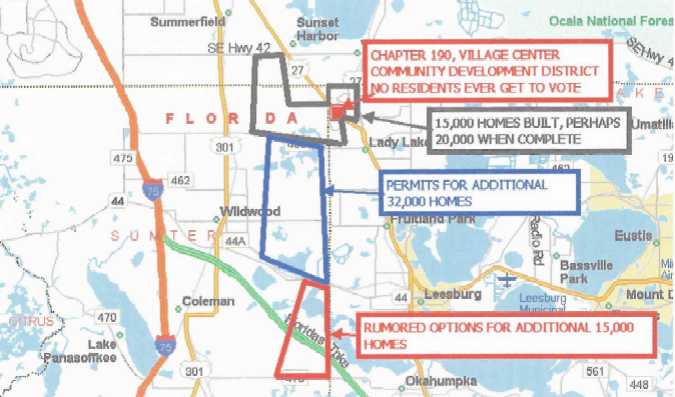A STATE LAW CHAPTER 190 COMMUNITY DICTATORSHIP A very popular rapidly growing retirement community North of Leesburg, FL and South of Ocala, FL. currently has about 15,000 houses and about 5,000 lots developed for construction, permits have been granted for an additional 32,000 houses and it is rumored that land has been optioned for an additional 15,000 houses. The development will extend about five miles East to West and about fifteen miles from North to South with about 67,000 houses and a population of about 140,000 people State Law Chapter 190 allows developers to issue tax free bonds for initial infrastructure. The law refers to the SERVICE AREA WITHIN THE DISTRICT. In this community the Community Development District, CDD, is a commercial shopping area in Lake County that is totally owned by the developer and his associates. About 98% of the service area will be outside of the district. State Law 190 provides for residents to rapidly take voting control of a CDD Board of Supervisors and it suggests that the CDD should soon be absorbed by a traditional form of government. In this community no residents live in the CDD therefore, the developer will always control the board of supervisors and make all of the important decisions in local government. The residents will never be permitted to vote for the board of supervisors or any other form of government. State Law 190 restricts a CDD to one county. In this community the CDD is delineated to be in Lake County; however, its service area is in Lake County, Marion County and Sumter County. Governor Bush has appointed a Destination
Florida Commission to determine what Florida must do to maintain a favorable
position for development to remain one of its major economic engines. Is
it good public policy for a CDD community to become an unincorporated community
of 67,000 homes with a population of 140,000 people and remain governed
by a developer dictatorship? Is this what was intended by State Law
190, or has the law been misinterpreted? Either State Law 190 needs to
be interpreted differently or it needs to be amended.
WHEN IS CONFLICT OF INTEREST LEGAL IN LOCAL COMMUNITY GOVERNMENT? We expect local community government to be run in an honest manner, free of conflict of interest and responsible to the voters. Unfortunately State Law, Chapter 190 is flawed and is in need of amendment. Urban planners, including some university professors, believed that there would be merit in permitting developers that planned and developed large residential communities to be granted the authority to use financing via the municipal bond route so as to make available to them low cost funds to provide facilities and services generally provided by a city. The good intention went astray when the legislature made use of a bill authored by developers and other interests that wished to promote, manage and control the Community Development Districts authorized by Florida State Statute, chapter 190. At the point at which a CDD is planned and put into effect the developer always owns the vast majority of the lots, thus having initial absolute control of the CDD. The Developer appoints a slate of candidates for the Board of Trustees and elects them to office. They are generally employees or business associates of the developer and will vote to run the CDD as he directs. Read this carefully and see how conflict of interest got legislated to be legal. State Statute, Chapter 190, paragraph 190.007 Board of Supervisors; general duties (1) the board shall employ, and fix the compensation of a District manager. The district manager shall have charge and supervision of the works of the district and shall be responsible for preserving and maintaining any improvement or facility constructed or erected pursuant to the provisions of this act, for maintaining and operating the equipment owned by the district, and for performing such other duties as may be prescribed by the board. It shall not be a conflict of interest under chapter 112 for a board member or a district manager or any other employee of the district to be a stockholder, officer, or employee of a landowner. The district manager may ……….. The italisized sentence is innocuous if you interpret land owner as one resident, but, takes on a different and dangerous meaning when it is interpreted as being the developer and becomes totally unacceptable when chapter 190 is prostituted as has been done in the Village Center Community Development District, VCCDD. In Sumter County CDD #1, CDD #2 and CDD #3 will ultimately be controlled by the residents; however if the current level of apathy continues the residents will fail to elect a board responsive to the will of the people. The Central CDD is a different story. The developer formed the district as being the commercial district, which he owned. He will always control the Center CDD unless he is forced to expand the district to include all of the homes served by the central CDD sewer and water system. It is this writer’s opinion that to fail to let the district grow to match its service territory is a prostitution of Chapter 190. The only way we will ever control our destiny is to over come our apathy any become involved. You can’t sit back and let George do it ….. it’s not in George’s job description. Our State Legislature must know that we are dissatisfied and we want Chapter 190 revised. The people that put up the money to retire the bonds should have the vote to control the board and make the board responsive to the people and free of conflict of interest. |
